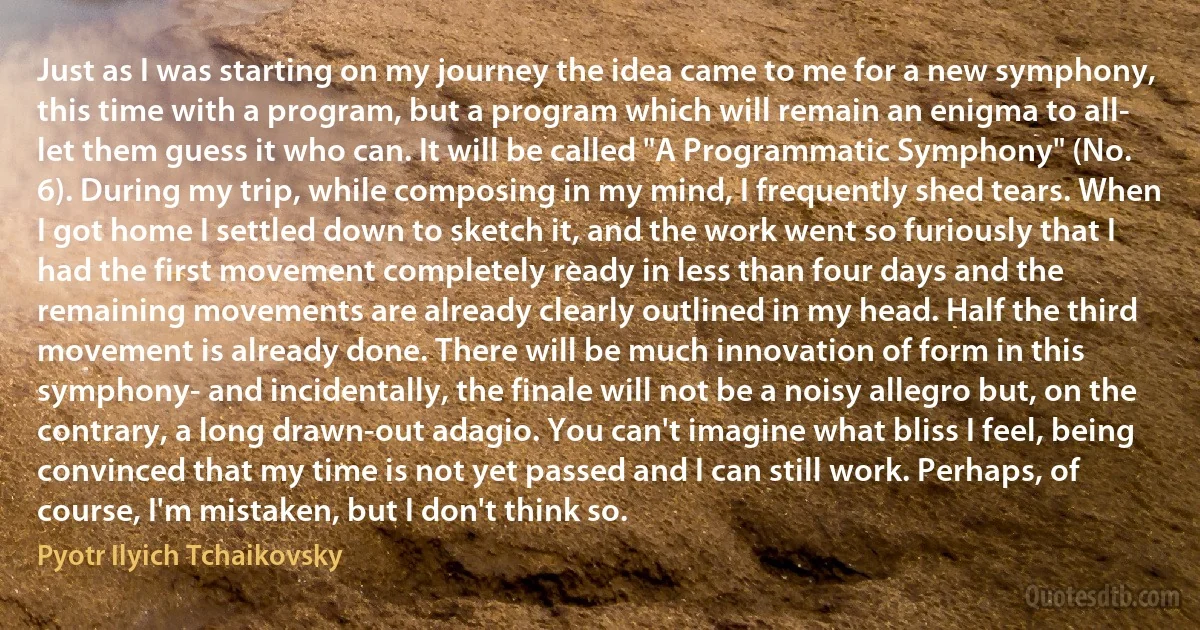
Just as I was starting on my journey the idea came to me for a new symphony, this time with a program, but a program which will remain an enigma to all- let them guess it who can. It will be called "A Programmatic Symphony" (No. 6). During my trip, while composing in my mind, I frequently shed tears. When I got home I settled down to sketch it, and the work went so furiously that I had the first movement completely ready in less than four days and the remaining movements are already clearly outlined in my head. Half the third movement is already done. There will be much innovation of form in this symphony- and incidentally, the finale will not be a noisy allegro but, on the contrary, a long drawn-out adagio. You can't imagine what bliss I feel, being convinced that my time is not yet passed and I can still work. Perhaps, of course, I'm mistaken, but I don't think so.
Pyotr Ilyich TchaikovskyRelated topics
came composing course done enigma finale form four went half head home idea innovation journey less mind mistake perhaps ready remain shed sketch symphony think third time trip while work yet tears daysRelated quotes
What becomes of human free will and agency? ...it seems to me to involve one of the most admirable laws of conservation in nature-a law which presents a new proof of the wisdom of the Creator... It is necessary, then, to admit that free-will exercises itself within indefinite limits, if one wishes not to incur the reproach of denying it altogether. But, with all the follies which have passed through the head of man, with all the perverse inclinations which have desolated society, what would have become of our race during so many past ages? All these scourges have passed by, and neither man nor his faculties have undergone sensible alterations, as far at least as our observations can determine. This is because the same finger which has fixed limits to the sea, has set similar bounds to the passions of men-because the same voice has said to both, "Hitherto shalt thou come, and no farther!"

Adolphe Quetelet
Whatever else we can say about this referendum campaign, we have touched sections of the community who've never before been touched by politics. These sections of the community have touched us and touched the political process. I don't think that will ever be allowed to go back to business as usual in politics again. So friends, sometimes it's best to reflect where we are on a journey. 45 per cent, 1.6 million of our fellow citizens voting for independence, I don't think that any of us whenever we entered politics would have thought such a thing to be either credible or possible. Today of all days as we bring Scotland together let us not dwell on the distance we have fallen short. Let us dwell on the distance we have travelled and have confidence that the movement is so broad in Scotland that it will take this nation forward and we shall go forward as one nation. Thank you very much.

Alex Salmond
At the point at which the concept of différance, and the chain attached to it, intervenes, all the conceptual oppositions of metaphysics (signifier/signified; sensible/intelligible; writing/speech; passivity/activity; etc.)- to the extent that they ultimately refer to the presence of something present (for example, in the form of the identity of the subject who is present for all his operations, present beneath every accident or event, self-present in its "living speech," in its enunciations, in the present objects and acts of its language, etc.)- become non pertinent. They all amount, at one moment or another, to a subordination of the movement of différance in favor of the presence of a value or a meaning supposedly antecedent to différance, more original than it, exceeding and governing it in the last analysis. This is still the presence of what we called above the "transcendental signified.

Jacques Derrida
In every third world age (Dvapara), Vishnu, in the person of Vyasa, in order to promote the good of mankind, divides the Veda, which is properly but one, into many portions. Observing the limited perseverance, energy, and application of mortals, he makes the Veda fourfold, to adapt it to their capacities; and the bodily form which he assumes, in order to effect that classification, is known by the name of Veda-vyasa. Of the different Vyasas in the present Manvantara and the branches which they have taught, you shall have an account. Twenty-eight times have the Vedas been arranged by the great Rishis in the Vaivasvata Manvantara... and consequently eight and twenty Vyasas have passed away; by whom, in the respective periods, the Veda has been divided into four. The first... distribution was made by Svayambhu (Brahma) himself; in the second, the arranger of the Veda (Vyasa) was Prajapati...

Vyasa
Love is the closest thing to laughter and the closest thing to tears. Love is the motive power of everything in the universe that has beauty in it. Love is the reason for everything and the reward for everything.
It's always seemed strange to me that we have to use the word love for so many things. And yet when you come to think of it, that's all right, too, because love is in everything in some form or another. Without it, I imagine the flowers would stop blooming and the sun would stop shining and people would stop laughing, and even the rain wouldn't fall.
So love is always growth.
I think if I could have just one word for love-it would be understanding.
Love must always be unselfish, and strangely enough, love is the only thing in the world that ever is unselfish. And if it isn't unselfish, it's only a counterfeit of love.

Harold Lloyd
